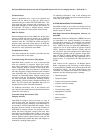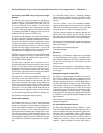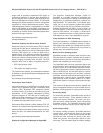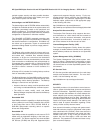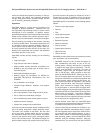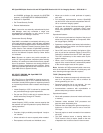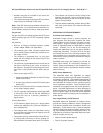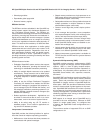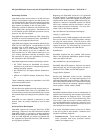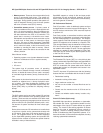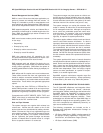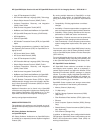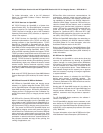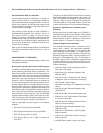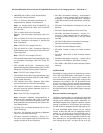HP OpenVMS Alpha Version 8.3 and HP OpenVMS Version 8.3-1H1 for Integrity Servers SPD 82.35.14
Networking Facilities
OpenVMS provides device drivers for all HP local area
network (LAN) adapters listed in the LAN Options sec-
tion of Appendix A of this SPD. Application programmers
can use the QIO system service to communicate with
other systems connected via the LAN using either
Ethernet or Institute of Electrical and Electronics Engi-
neers (IEEE) 802.3 packet format. Simultaneous use
of HP Ethernet and the IEEE 802.3 protocols are sup-
ported on any HP LAN adapter.
OpenVMS Alpha supports Ethernet, FDDI, Token Ring,
and ATM for local area networks (LANs). OpenVMS for
Integrity servers supports Ethernet only.
OpenVMS Alpha supports the standards defined by the
ATM Forum’s LANE Version 1.0 specifications for LAN
emulation over an ATM network. By implementing an
emulated LAN over an ATM network, you enable a
group of ATM stations to act like a traditional LAN.
LAN emulated over an ATM network allows you to run
your existing applications basically unchanged, while
the computers on which your applications are running
are connected to the ATM network.
OpenVMS supports the following networking products:
• HP TCP/IP Services for OpenVMS, the industry-
standard set of protocols for interoperating between
different operating systems
• HP DECnet-Plus, the Digital Network Architecture,
Phase V
• DECnet, the DIGITAL Network Architecture, Phase
IV
These networking products are described in this SPD
under Associated Products.
Terminal Server Products
HP terminal server products provide terminal server ac-
cess to OpenVMS. When used in an OpenVMS Clus-
ter environment, terminal servers distribute users across
the available Alpha and Integrity server systems at login
time.
OpenVMS can also establish a connection to other
devices (such as printers) attached to such terminal
servers.
Universal Serial Bus Support
OpenVMS supports the Universal Serial Bus (USB)
technology. Support for the USB interconnect enables
OpenVMS systems to connect to multiple supported
USB devices using a single USB cable. OpenVMS sup-
ports one USB keyboard and mouse on systems that
are supported by OpenVMS and have USB hardware
and a graphics controllers.
Beginning with OpenVMS version 8.3, HP OpenVMS
I64 serial support is provided through the USB serial
multiplexer (MUX). OpenVMS supports several generic
chipsets which allow third-party USB-based serial mul-
tiplexers to connect to OpenVMS systems for RS232
serial lines, traditional terminal connections, and low-
speed system-to-system connectivity. For more infor-
mation, refer to the following website:
http://h71000.www7.hp.com/openvms/integrity/
integrity_io_options.html
OpenVMS provides a USB configration tool called UCM
that can be used to track USB configuration changes
like plug and unplug events. UCM can also be used
to restrict the automatic addition of specific devices and
classes of devices. The UCM event log is used by HP
to help diagnose problems with USB devices.
AlphaServers
OpenVMS supports the fully qualified USB devices
listed in the appropriate AlphaServer platform configu-
ration and options web site:
http://h18002.www1.hp.com/alphaserver/
OpenVMS Alpha USB support is limited to low and full
speed devices only, and currently supports only the Al-
phaServer ES47, ES80, and GS1280 systems.
Integrity Server Systems
Starting with OpenVMS version 8.3-1H1, OpenVMS
supports USB low-, full-, and high-speed devices for all
supported OpenVMS Integrity systems. USB DVD sup-
port in OpenVMS version 8.3-1H1 includes both reading
and burning DVDs on the following supported Integrity
server systems: rx2660, rx3600, rx6600.
Reliability
OpenVMS handles hardware errors as transparently as
possible while maintaining data integrity and providing
sufficient information to diagnose errors. The system
limits the effects of an error by first determining if the
error is fatal. If the error occurs in system context, the
current OpenVMS system shuts down. If the error is not
fatal, the system recovers actions pertinent to the error
and continues the current operation.
In all cases, information relevant to the error is written
to the error log file for later analysis. Hardware errors
include the following categories:
• Processor errors. These include processor soft
errors, processor hard errors, processor machine
checks, and adapter errors.
12



